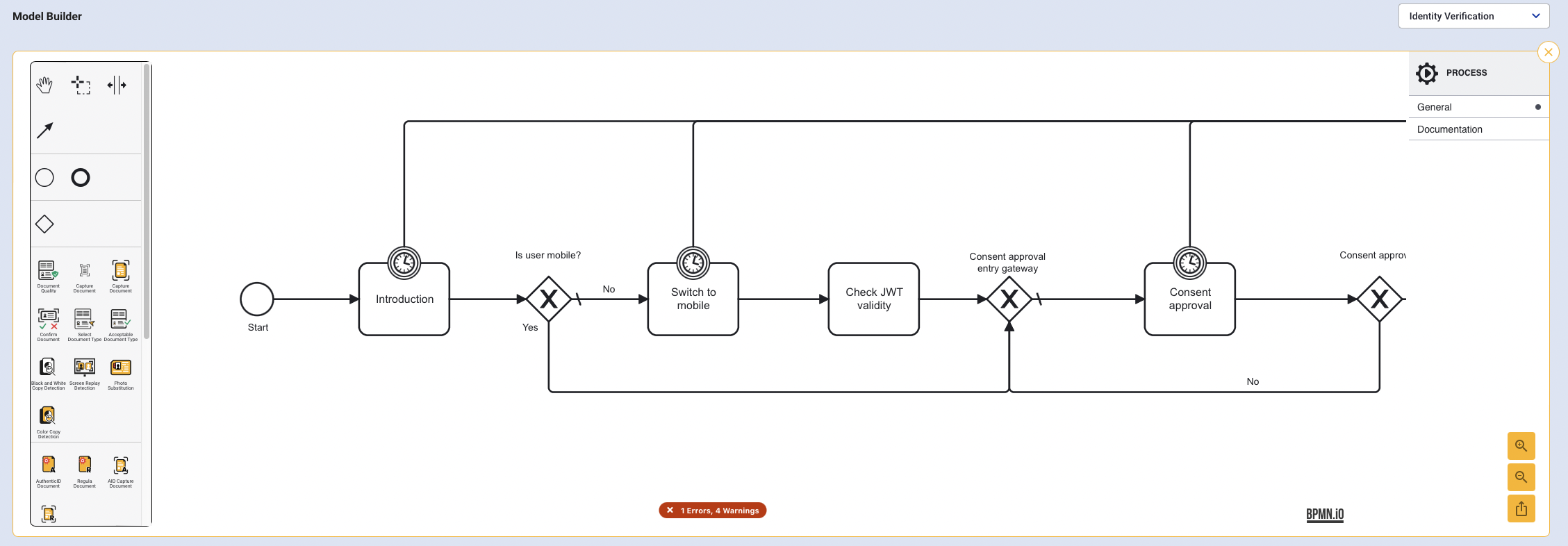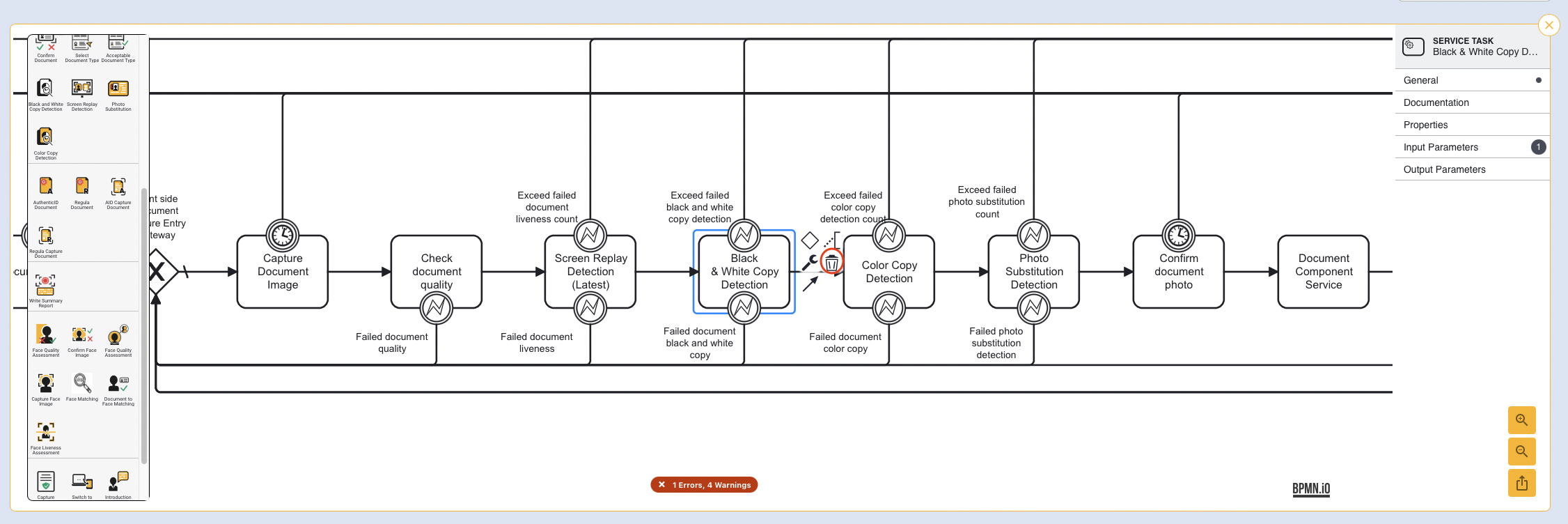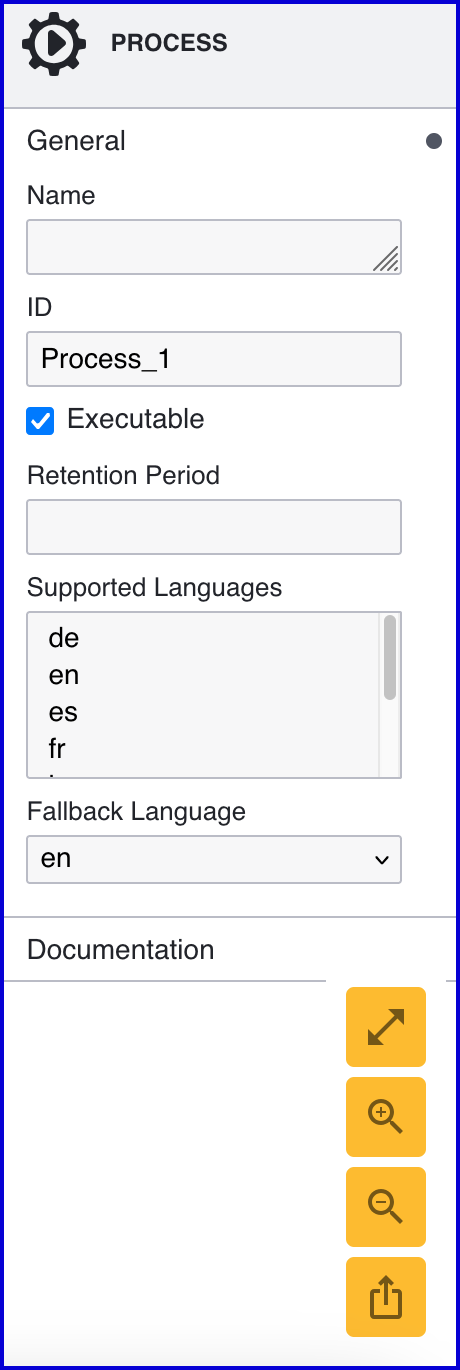Title
Create new category
Edit page index title
Edit category
Edit link
Edit Process Definition
This document will explore using the BPMN.io editor to update Process Definitions and design your Identity Verification flow.
What is a BPMN Diagram
BPMN stands for Business Process Mode and Notation. It is a flow chart method used to plan business processes from end to end. This model also represents the Process Definition used to define your onboarding and authentication flow.
Diagram Elements and Symbols
Control Icons
| Name | Description | Icon |
|---|---|---|
| Start | Start point of a process definition. |  |
| End | End point of a process definition. |  |
| Time Boundary Event | This event occurs when the user has run out of time in responding to a task. For example, when taking too long to confirm a document photo after it has been captured. |  |
| Error Boundary Event | This event occurs when there is an error during the process. |  |
| Exclusive Gateway | An exclusive gateway denotes that there are alternative paths within the process flow, and that in any instance of the flow, only one path can be taken. |  |
| Activity | An activity describes the activity to be carried out by the end user. |  |
| Sequence Flow | The path the user journey will take from one task to the next. |  |
| Lasso Tool | Move / Select multiple activities. |  |
| Hand Tool | Move / Select an activity |  |
Control/ Custom Activities Icons
| Name | Description | Icon |
|---|---|---|
| Acceptable Document | Verifies that the submitted document has not expired, is of the correct classification & is from the expected issuing country. |  |
| Black & White Copy Detection | Verifies that a document is not a black & white colour copy. |  |
| Capture Document | Prompts the user to perform document capture. |  |
| Capture Face Image | Prompts the user to perform face capture |  |
| Check QR Code | Validates that the user has come from QR code issued by TrustWeb when the user has scanned a QR code as part of after switching to mobile from Desktop. |  |
| Color Copy Detection | Verifies that a document is not a colour copy. |  |
| Confirm Document Image | This activity requests the user to confirm whether the document capture quality is acceptable before proceeding to the next step of the flow. |  |
| Confirm Face Capture | This activity requests the user to confirm whether the face capture quality is acceptable before proceeding to the next step of the flow. |  |
| Consent Validation | Verifies that the user has agreed to the presented consents. |  |
| Capture Consent | Asks the user to agree to the presented consents. |  |
| Document to Face Match | Matches the portrait face image from a document against the users face image. |  |
| Screen Replay Detection | Matches the portrait face image from a document against the users face image. |  |
| Document Quality | Checks that the submitted document meets the required quality standards. |  |
| Face Passive Liveness | Checks that the face image is no a face image being replayed from a device screen. |  |
| Face Quality | Checks that the submitted face meets the required quality standards. |  |
| Face Template Generation | Generates a face template for biometric matching later in the process. |  |
| Record Failure Summary | If the user fails out of the process this task records the failure. |  |
| Introduction | Displays introduction to the identity verification process to the user. |  |
| Photo Substitution | Ensures that the portrait photo on a document has not been replaced. |  |
| Record Summary | Record the outcome of the custom activities during the identity verification flow. |  |
| Select Document Type | Prompts the user to select the document they are going to capture. |  |
| Switch To Mobile Instruction | Provide instructions to a user of they are not on a mobile device on how to switch to a mobile device. |  |
| Switch To Mobile | Ask the user to scan a QR code to continue the identity verification process. |  |
| Switch To Dekstop | Directs the user from a mobile device to the desktop browser. The browser will redirect to the URL set as the _redirectURI value. |
 |
| Timeout Summary | Records that a user has timed out of the process. |  |
Using the Editor
This section will discuss how to use the BPMN diagram editor. The US Template R will be used as an example to illustrate the features available in the editor.
When US Template R is selected from among the available templates, the BPMN diagram below will be generated.

The US Template R BPMN Editor
Where some adjustments or changes are needed to the flow, the BPMN tool will allow for “drag and drop” type tailoring or modifications to the process.
Add an Activity

Adding Photo Substitution Task
To add a task to the Identity Verification flow, simply click and drag the task that you wish to add onto the BPMN diagram. Use the sequence flow arrows to connect the task.
The short video below demonstrates how to add a task and connect the task to the Identity Verification flow.
Delete an Activity

The screenshot above illustrates how simply clicking on a step within the journey, and using the “Remove” function, will withdraw the step from within the journey. Note the user needs to ensure to remove the associated arrow flow lines in order for this flow to function as intended.
Below is a short video demonstration of this activity.
Retention Period
The Retention Period represents the length of time (in days) that data captured by the Process Definition will be stored. To set the Retention Period, expand the 'General' menu option found on the Process menu panel at the right-side of the Process Designer.

The Retention Period accepts a number value, with a minimum value of 1. An unspecified value will default to a 30 day retention period. The Retention Period can be any value between 1 and 90 days (inclusive).
For example:

Once the Retention Period is set, click the 'Save' button to finalize configuration.